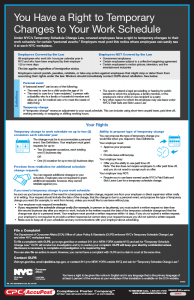 Earlier this year, the New York City Council passed Int. 1399-2016, amending the Fair Workweek Law. Effective July 18, 2018, employers must allow employees to take two temporary schedule changes per calendar year for a personal event.
Earlier this year, the New York City Council passed Int. 1399-2016, amending the Fair Workweek Law. Effective July 18, 2018, employers must allow employees to take two temporary schedule changes per calendar year for a personal event.
All employees who work 80 hours or more per calendar year in the City and who have been employed by their employer for 120 days or more can request a temporary change to their work schedule. The temporary change can only be to accommodate:
- the need for a caregiver to provide care to a minor child or care recipient;
- the need to attend a legal proceeding or hearing for subsistence benefits to which the employee, a family member or the employee’s care recipient is a party; or
- any circumstance that would constitute a basis for permissible use of safe time or sick time.
Employers may not require employees to use leave earned under New York City’s Paid Safe and Sick Leave Law for a temporary schedule change. Temporary changes to a work schedule include:
- using paid time off;
- working remotely;
- swapping or shifting work hours; or
- using short-term unpaid leave.
The temporary schedule change law establishes a written process for employees and employers to communicate regarding requests for such changes. Employees seeking temporary changes must notify their employers as soon as they become aware of the need for a temporary change to the work schedule. The initial notice is not required to be in writing; however a written request must be submitted no later than the second business day after he or she returns to work following the conclusion of the temporary change to the work schedule. The written notice must indicate the date for which the change was requested, the proposed type of temporary change, and that the change was due to a personal event. The employer must immediately respond to the temporary schedule change request. The initial response is required within 14 days of the employee’s written request. The employer’s response must include:
- whether the request was granted or denied;
- how the request was accommodated (if granted) or the reason for denial (if denied)
- number of requests the employee has made for temporary schedule changes; and
- how many days the employee has left in the calendar year for temporary schedule changes.
If the employee does not submit a written request, the employer is not required to provide a written response but cannot deny the request because the employee did not submit a written request. Employers can deny a temporary schedule change only if the employee has exhausted the two allotted requests in the calendar year or if the employee is covered by a collective bargaining agreement; has been employed for less than 120 days; works in the theater, film, or TV industry; or works less than 80 hours in a calendar year.
The law also protects employees from employers retaliating against them for making schedule change requests. The penalty for violation of the law is a $500 fine and an order directing compliance. However, an employer with the written response required under the law may cure the violation without a penalty by presenting proof that it provided the employee with the required written response within seven days of receiving notice of the opportunity to cure.
Employers are required to display the New York City Temporary Schedule Change poster where employees can easily see it. Employers must display this poster in English and in any language that is the primary language of at least five percent of the workers at a workplace. At the moment, the Department of consumer Affairs does not have translated copies available. To order your English copy, click here.

